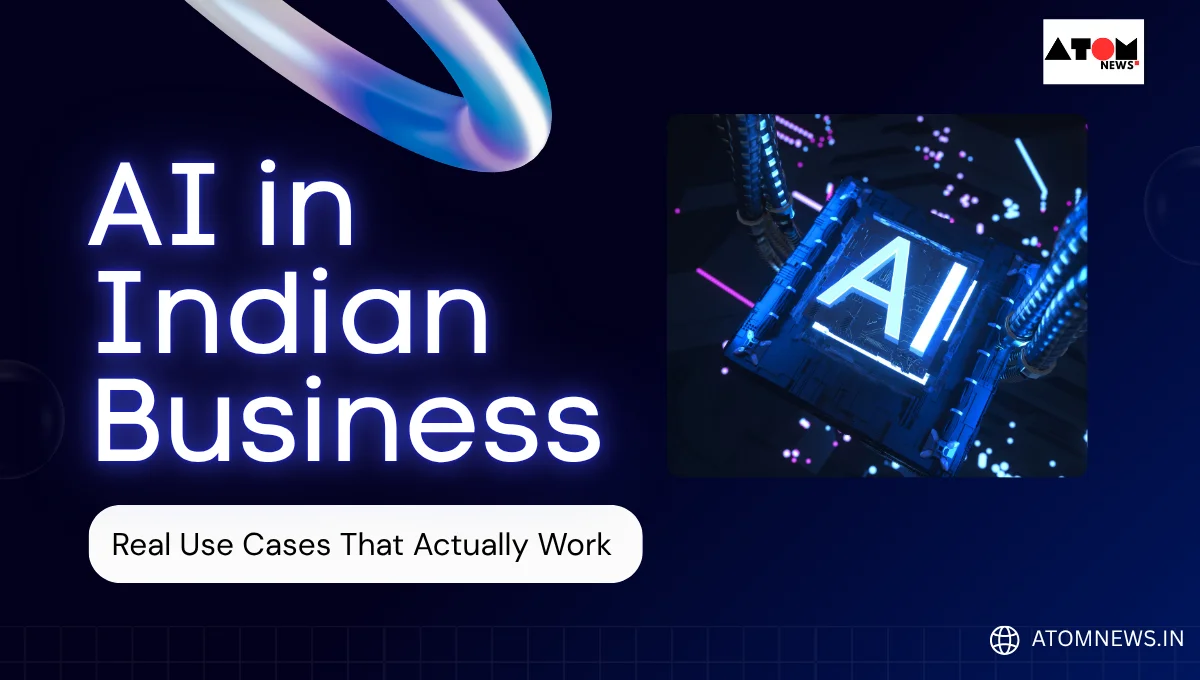AI adoption in India has moved far beyond experimentation. From MSMEs and startups to large enterprises, businesses across sectors are now using AI to solve real operational challenges, enhance customer experience, reduce costs and unlock new revenue opportunities. As India becomes one of the world’s fastest-growing AI markets, the shift is clear—companies no longer ask “Should we use AI?” but rather “Where can AI deliver the fastest impact?”
With practical applications rising across finance, retail, logistics, healthcare, agriculture and education, AI is becoming an essential part of day-to-day business operations. Backed by credible research and industry reports, here are the real AI use cases in India that are delivering measurable results.
Customer Support Automation: AI Chatbots That Reduce Workload
AI-powered chatbots and virtual assistants have become one of the most widely adopted tools in Indian businesses. According to the NASSCOM AI Adoption Report 2024, more than 64% of Indian enterprises now use chatbots to manage high-volume customer queries.
Banks, telecom companies, e-commerce brands and D2C businesses use conversational AI to handle FAQs, issue resolution, lead qualification and account-related information. This reduces support costs and cuts response times drastically. For many businesses, chatbots handle over 60–70% of customer conversations without human intervention.
Predictive Analytics for Smarter Business Decisions
Predictive AI models are helping companies forecast demand, track customer behaviour, plan inventory and optimize pricing. The EY Future of AI Report highlights that predictive analytics has the highest ROI among all AI categories for Indian enterprises.
Retailers predict purchase trends, fintech startups use AI to identify credit risk, healthcare platforms use predictive modelling to track appointment patterns, and ecommerce firms use it to estimate delivery times.
Predictive analytics delivers real value because it turns scattered operational data into actionable decision-making frameworks.
AI-Driven Sales & Marketing Automation
Indian businesses are rapidly adopting AI to enhance marketing precision. From content generation and email personalisation to lead scoring and automated nurturing, AI is now central to digital campaigns.
Reports from Salesforce India show that companies using AI for marketing are seeing a 25–35% increase in campaign efficiency.
AI tools help marketers create ads, segment audiences, analyse consumer intent and optimise budgets in real time. For small businesses, AI levels the playing field by enabling sophisticated targeting without large marketing teams.
AI in Supply Chain & Logistics: Reducing Delays and Cost
India’s logistics sector benefits heavily from AI-led route optimisation, warehouse automation and demand forecasting. According to the Deloitte India Logistics AI Study, AI can reduce supply chain delays by up to 40% when implemented correctly.
Courier companies, hyperlocal delivery apps, warehousing startups and e-commerce brands use AI to:
- Predict delays
- Assign efficient delivery routes
- Manage warehouse inventory
- Reduce fuel and logistics costs
This has become critical in India’s fast-growing e-commerce environment, where millions of orders must be delivered daily with precision.
AI in Indian Finance: Fraud Detection & Credit Scoring
Banks, NBFCs and fintech brands in India depend on AI for risk assessment and fraud prevention. The RBI Fintech Report 2024 states that AI-based fraud detection systems identify anomalies up to 10 times faster than manual systems.
Fintech startups like KreditBee, Slice, Paytm and ZestMoney use AI models to analyse alternative data—digital footprints, transaction history and behavioural patterns—to assess creditworthiness for new-to-credit users.
AI reduces onboarding time, prevents fraud and improves lending accuracy.
AI in Retail: Personalisation and Smart Recommendations
Indian retail brands increasingly rely on AI recommendation engines—similar to those used by Amazon and Netflix—to improve sales. A study by Accenture India shows that AI-driven personalisation results in up to 30% higher conversions for online retailers.
🔗 External Source: https://www.accenture.com/in-en
From clothing to electronics, AI analyses past purchases, browsing behaviour and preferences to deliver personalised suggestions. Offline stores also use AI for footfall analytics, product placement and in-store heat mapping.
AI in HrTech: Automated Hiring and Employee Analytics
Recruitment, once heavily manual, has been transformed through AI-powered screening, skill mapping and interview automation. Indian HR platforms use AI to scan resumes, shortlist candidates, analyse behaviour, evaluate suitability and predict employee performance.
According to the LinkedIn India Talent Trends Report, nearly 70% of Indian organisations now use AI tools in at least one stage of hiring.
AI in Healthcare: Faster Diagnosis & Operational Efficiency
AI is widely used by Indian hospitals and healthtech startups for diagnostics, telemedicine, triaging and radiology. The McKinsey Health AI Survey shows that AI-enabled radiology can reduce diagnosis time by up to 50%, improving access for rural patients.
AI also assists with appointment scheduling, insurance claims automation, symptom checkers and medical transcription—making healthcare more accessible.
AI in Agriculture: Practical, Ground-Level Impact
India’s agri-tech sector uses AI for:
- Weather prediction
- Soil analysis
- Pest detection
- Crop yield estimation
The NITI Aayog AI for Agriculture Report highlights that AI can boost farm yields by 15–20% when combined with precision-farming tools.
This is especially impactful for small farmers who depend on accurate information for decision-making.
The Bottom Line
AI in Indian business is no longer experimental—it is practical, profitable and essential for scaling in a highly competitive environment. From customer support and predictive analytics to retail personalisation and logistics optimisation, AI delivers clear, measurable results across industries. As adoption accelerates and tools become more accessible, Indian businesses that integrate AI deeply into operations will lead the next decade of innovation.





